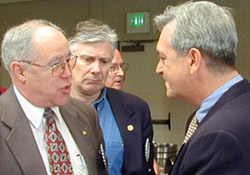|
|

BBRC Members Phil Salvatori and Brian Evison chat with Friday’s speaker, Dave Ammons.
|
Dave Ammons, dean of the political writers in Washington State, served up a palette of tidbits about the state’s primary
election and gave some predictions for the November 7 General Election. Introduced by Craig Groshart as the journalist considered “most fair and honest” by scores of politicians,
Ammons has covered six governors, dating back to Dan Evans. He also pens a weekly political column which is seen in the Eastside Journal.
Remarking about his “near late arrival,” Dave said he left Olympia at 6:00 a.m., and arrived at Glendale at 7:45. “Maybe I
will pay more attention to transportation issues after that commute!”
Ammons said this has been a “marvelous year” for political writers. “Covering the Washington legislature, and particularly the
House, in their 49-49 tie, it’s been a frustrating, irritating session, which both parties are hoping to put behind them on November 7.”
He pointed out that the Presidential campaign has seen both major candidates crisscrossing Washington … “usually, it’s a
bubble you can’t pierce, but these guys have actually been seeking out journalists in order to get a little coverage.”
Ammons was quite disappointed with the turnout at the September 19 primary. “A 30% turnout in a presidential election
year was really sad. I thought voters would at least turn out for the last chance to vote in the blanket primary.”
One of the “amazing things about the recent primary was Maria Cantwell’s expenditure of $5 million of her own money. Ammons
said he plans to write a column in the next few weeks on campaign finance. “Cantwell, who is reportedly worth $40 million, really had the field to herself on TV. I guess she can say she’s not
beholden to any group when she doesn’t take anybody else’s money. Deborah Senn did everything she was suppose to as a traditional candidate … started early, tapped over 14,000 donors
and got 13% of the vote. Cantwell captured 37%. I still think Gorton will win in November.”
Money didn’t work in other races, noted Ammons. “Mike Wensman, running for the GOP nod for Secretary of State, spent
$200,000 on TV ads. He settled for a poor showing. The Supreme Court judgeships were all over the map. I wonder if it’s time again to explore other ways of electing our judges,” Ammons observed.
This was a year for political recycling … “Mike Lowry became the Democrats’ candidate for Lands Commissioner … a former
Governor and Congressman, who I once said couldn’t win a statewide race! Don Bonker, former 3rd District Congressman, won the Democratic primary, to meet Sam Reed in November.
For Insurance Commissioner, Mike Kreidler, former 9th District Congressman, took the Democratic primary, set to meet Bellevue’s Don Davidson in November.”
Ammons was surprised at the stealthiness of the Libertarian Party. They had candidates for all major statewide posts and in
many legislative races. They polled the necessary 1+ percent which will get them on the November ballot.
The primary gave the Democrats a tiny boost towards taking control of the House and breaking the two-year tie. Ammons
thought the upward trend was somewhat fragile, however. Governor Gary Locke polled about 55%, giving him the edge over his opponent John Carlson. Under a little know facet of the
election laws, if a nonpartisan Superintendent of Public Instruction candidate receives more votes than all of the other candidates combined, this person advances to the General
Election without competition. Terry Bergeson did that on September 19.
Someone in the audience questioned why Christine Gregoire wasn’t taken more to task for the shortcomings in her office
recently. Ammons responded that he was surprised there was little heat for the Attorney General, but reasoned that she had a reservoir of goodwill and bipartisan support, stemming from the
tobacco settlement and other actions during the past four years.
Specifically responding to a question regarding the election for judges, Ammons said a commission studied the issue about five
years ago, but did not reach a conclusion. One proposal had a commission nominating several people, submitting the list to the Governor, who would appoint the judge, and then the people
would ratify the choice in the next election. Ammons pointed out that “Washington has a history of populist support … noted by the number of initiatives on the ballot each year. Voting directly for
Supreme Court judges is something they like to do, and I’ve noted all these years that the people generally have good sense and intuition about candidates.”
Again, thanks to Craig Groshart for his introduction.
|